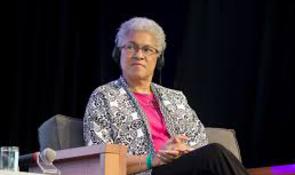Black Fem Exchange
Alice's Portal
Home
Womanism: Open Forum
History/Background
NBN Commentary
Open Forum
Patricia Hills Collins from "The Womanist Reader"
What's in a Name? Womanism,
Black Feminism, and Beyond
"Despite her disclaimer [Walker] that womanists are "traditionally universalist," a philosophy invoked by her metaphor of the garden where room exists for all flowers to bloom equally and differently, Walker implies that black women are somehow superior to white women because of this black folk tradition. Defining womanish as the opposite of the frivolous, irresponsible, not serious, girlish, Walker simultaneously implies that black women are somehow superior to white women because of this black folk tradition....Womanist is to feminist as purple to lavender clearly seems designed to set up this type of comparison--black women are "womanist" while white women remain merely "feminist." This usage sits squarely in black nationalist traditions premised on the belief that blacks and whites cannot function as equals while inhabiting the same territory or participating in the same social institutions. Since black nationalist philosophy posits that white people as a group have a vested interest in continuing a system of white supremacy, it typically sees little use for black integration or assimilation into a system predicated on black subjugation. Black nationalist approaches also support a black moral superiority over whites because of black suffering."
____________
"Walker's use of womanism promises black women who both operate within these black nationalist assumptions and who simultaneously see the need to address "feminist" issues within African American communities partial reconciliation of these two seemingly incompatible philosophies. Womanism offers a distance from the "enemy," in this case, whites generally and white women in particular, yet still raises the issue of gender. Due to its endorsement of racial separatism, this interpretation of womanism offers a vocabulary for addressing gender issues within African American communities without challenging the racially segregated terrain that characterizes American social institutions."
_____________
"Current debates about whether black women's standpoint should be named "womanism" or "black feminism" reflect this basic challenge of accommodating diversity among black women. In her acclaimed volume of essays, In Search of Our Mother's Gardens, Alice Walker (1983) introduced four meanings of the term "womanist." According to Walker's first definition, a "womanist" was "a black feminist or feminist of color". Thus on some basic level, Walker herself uses the two terms as being virtually interchangeable...."
_______________
"Womanism appears to provide an avenue to foster stronger relationships between black women and men, another very important issue for African American women regardless of political perspective. Again, Walker's definition provides guidance where she notes that womanists are "committed to survival and wholeness of entire people, male and female." Many black women view feminism as a movement that at best, is exclusively for women and, at worst, dedicated to attacking or eliminating men. Sherley Williams takes this view when she notes that in contrast to feminism, "womanist inquiry...assumes that it can talk both effectively and productively about men." Womanism seemingly supplies a way for black women to address gender oppression without attacking black men."
Welcome to the New Black Nationalist 1st Womanism Open Forum.
On April 10, 2021, NBN reached consensus to embrace poet-author-laureate Alice Walker’s originalist articulation of 'womanism' as an indispensable social theory for Black women’s emancipation.
Walker's articulation of "womanism" first appeared in 1979 in the short story "Coming Apart," and was subsequently expanded in the 1983 publication of "In Search of My Mother's Gardens."
Over the years, the concept of womanism spread to every corner of planet, particularly among women of color. Its theoretical enlargement engendered alternative schools of thought: Africana Womanism, African Womanism and a theological strain of womanist liberation theory.
As New Black Nationalists' primary task is creating analytical products that support the formation of a new non-heteropatriarchal Black nation-state, the ongoing theoretical development of "womanism" is critical to preparing for revolutionary change in the 2020's.
This first forum, and future forums are vital to sharing information and analysis to deepen and enrich womanist thought.
We have selected excepts from a 1996 article written by Patricia Hill Collins titled "What's in a Name? Womanism, Black Feminism, and Beyond," to launch the forum. The full article appears in "The Womanist Reader" [2006] , Layli Phillips - Editor.
Written more than two decades after Alice Walker's originalist formulation appeared, Collins's critique of womanism is pointed, unambiguous, sincere, and comprehensive. It touches on the major thematic groove of Alice Walker's construct.
Since 1996, the Black Feminist movement of which Patricia Hill Collins is a major force, has grown in its political sophistication, influence within the academy, theoretical production, and movement activism as manifested in the leadership ranks of the Black Lives Matter movement. Thus, some of the questions raised by Collins's 1996 critique of womanism, must be considered in light of important advances realized over the past quarter-century.
New Black Nationalists, do not believe that an antagonist relationship exists between those who regard themselves as Black womanists and Black feminists or what we regard today as the Black Feminist Movement [BFM].
From our perspective the contemporary house of the BFM consist of self-identified Black feminists, the LGBTQ community, and various schools of non-binary and gender non-conforming individuals.
Moreover, while there are certainly Black and Global South self-identified womanists, New Black Nationalists question whether there is a broadly identifiable contemporary womanist movement with a viable center.
That being said, our embrace of womanism is not predicated on glomming on to an existing trend or attaching ourselves as a variant of the current Black Feminist movement, which we regard as a powerful force.
Indeed, our decision to embrace womanism comes after an extended period of conducting a Black Feminist -- Black Nationalist Exchange to build dialogue and comity between our communities.
In short, New Black Nationalists simply feel Alice Walker's originalist articulation of womanism comports with the rhythm and concepts of our Nationalist-Humanist Project and Fanonist philosophical hue.
That being said, Patricia Hill-Collins's observations on womanism constitute valid and important questions of difference. They also proffer a reference point for measuring how far womanism and Black Feminism have traveled over the last four decades. Revisiting Ms. Hill-Collins's critique also allows us to discern how much convergence has occurred these trends and their directionality in the cataclysmic social upheaval already unfolding in the turbulent 2020s.
Thank you for visiting our open forum. We encourage your input and thoughts. Contact us at on Twitter. We'd love to hear from you.
Womanism
Open Forum

